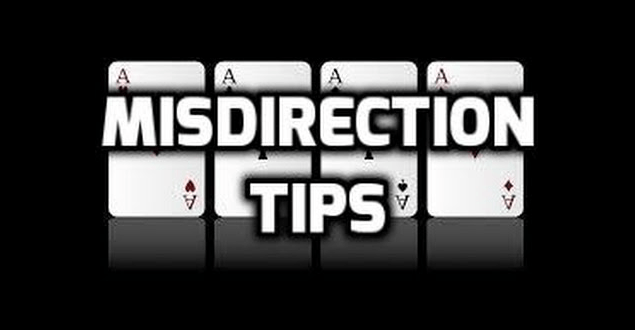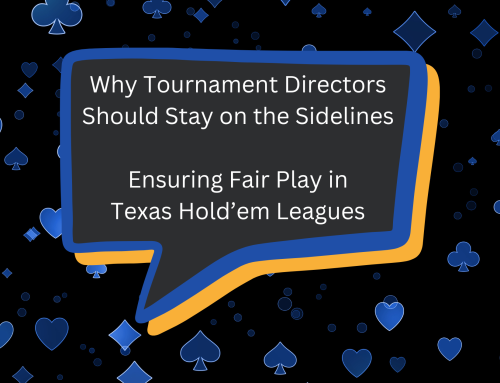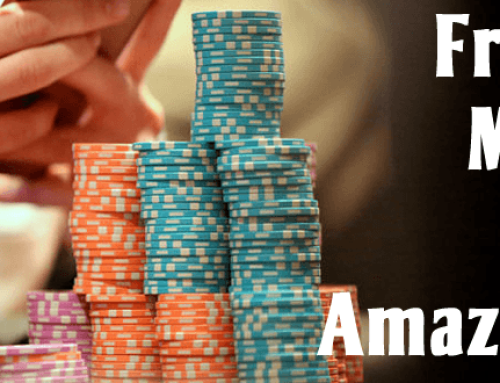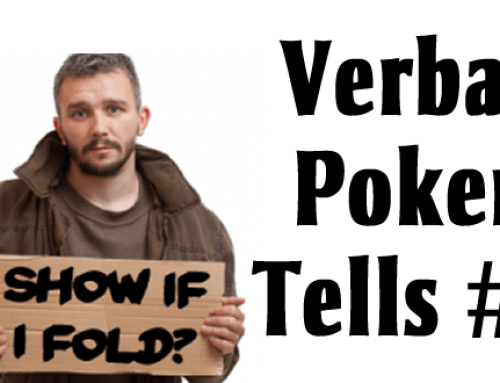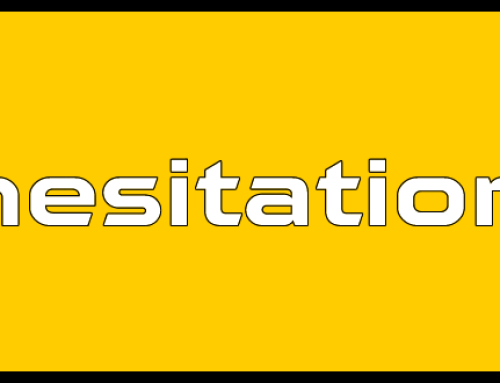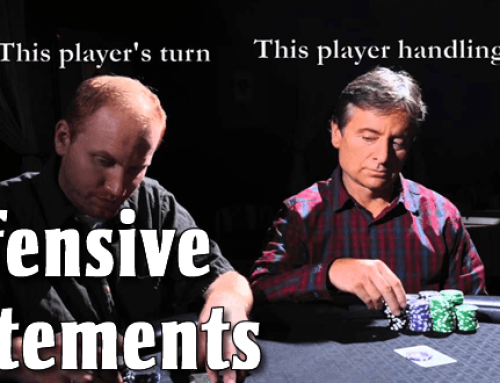Misdirections are an attempt to “explain away” the true meaning behind a speaker’s action. Another fitting word for them would be excuses.
Some examples will be the best way to explain what these statements are and how they often show up:
High Stakes Poker, high stakes NLHE cash game
Guy Laliberté has rivered the nuts with A♠ K♦ on a board of A♦ A♥ 5♦ 9♠ K♣. He checks.
Daniel Negreanu, with J♠ J♥, bets $5,000 into a pot of $17,100.
Laliberté says, “Not very convincing” and then raises to $15,000.

He’s implying that he’s raising because Negreanu’s bet doesn’t convince him that Negreanu has a strong hand. This, in turn, implies that he (Laliberté) could be raising with a wide range of hands, including bluffs. In effect, he’s weakening his own hand range, which, as we talked about in the first email, makes it unlikely he’s actually weak.
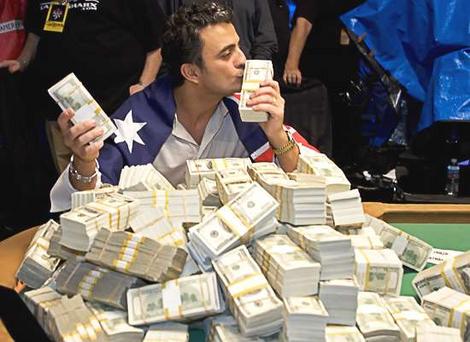
2005 WSOP Main Event NLHE Tournament
Steve Dannenmann has 9♥ 9♣ and flops a set on a board of T♦ 9♠ 5♦. Joe Hachem, holding A♦ K♦, checks the flop and Dannenmann bets 150,000. Hachem raises to 1M. Dannenmann shoves for 3.75M more.
Hachem says, “You’re staring me down as if you’ve got nothing.”
Dannenmann replies, “Everything else is extra credit from here for me, buddy.”
Hachem: “Sorry?”
Dannenmann: “Everything now is extra credit for me. I got past the first day.”
Hachem: “All-in, huh?”
Dannenmann (shrugs): “Hey, I’m just having fun.”
With his statements that “everything else is extra credit from here” and “I’m just having fun,” Dannenmann is implying that he doesn’t mind being eliminated because he’s happy just to have made it that far in the tournament. These statements imply that his raise is made not because he has a strong hand, but because he doesn’t much care about his fate. (Again, these statements indirectly weaken his hand range, which makes it unlikely he’s weak.)
Poker After Dark, high stakes NLHE cash game s4e25 ~12:00
On a turn board of A♠ Q♦ J♠ 2♥, Phil Hellmuth bets $1,100 into a pot of $3,000.
After betting, Hellmuth says, “It’s my last bluff at this pot, by the way.”
His opponent, Paul Featherstone, has K♦ T♣ for the nut straight. Featherstone says, “You’re bluffing?!… Well, if you’re bluffing, then I guess I should raise.” Then he puts in a raise to $3,100.
Featherstone is implying that he’s raising because he takes Hellmuth at his word that he’s bluffing.


High Stakes Poker, high stakes NLHE cash game
On a river board of A♦ 9♥ 8♣ K♠ Q♣, Eli Elezra bets $13,000 into a pot of $27,300.
Erick Lindgren says, “That’s the lucky number.” He’s referring to Elezra making a $13,000 river bet several times in past hands. Lindgren then raises to $40,000.
Elezra says, “Nice speech. ‘Lucky number’, then you throw this to me.”
Lindgren says, “Well, you bet it on the end four times.”
Lindgren seems to be attempting to explain what Elezra calls his “speech.” Because a speech accompanying a big bet is generally associated with a good hand, Lindgren seems to be saying: “I’m not making a speech because my hand is good; I said that only because you’ve bet $13,000 so many times.”
Results: Lindgren has J♣ T♠, for the nuts.
This is a case of a misdirection that seems intended to direct attention not from the bet itself, but from a behavior associated with the bet.
2006 WSOP NLHE Main Event Tournament
On a river board of A♥ 8♣ 2♠ 6♦ 2♥, Allen Cunningham is first-to-act and bets.
Jamie Gold says, “I raise… I’m all in.” Gold then stands up, smiles, and says, “Gotcha.”
Cunningham says, “Yep. I guess you do.”
Gold: “You know, I knew you didn’t have it.”
Gold implies that he raised all-in because he knew Cunningham was weak—as opposed to raising due to having a strong hand.

Results: Cunningham folds his A♣ T♣. Gold had 8♠ 8♦, for the full house.
While Gold was known for making a lot of tricky verbal statements, his misdirection’s when betting will still be highly correlated to strong hands. (Gold’s behavior is also goading, which makes it likely he has a strong hand.)
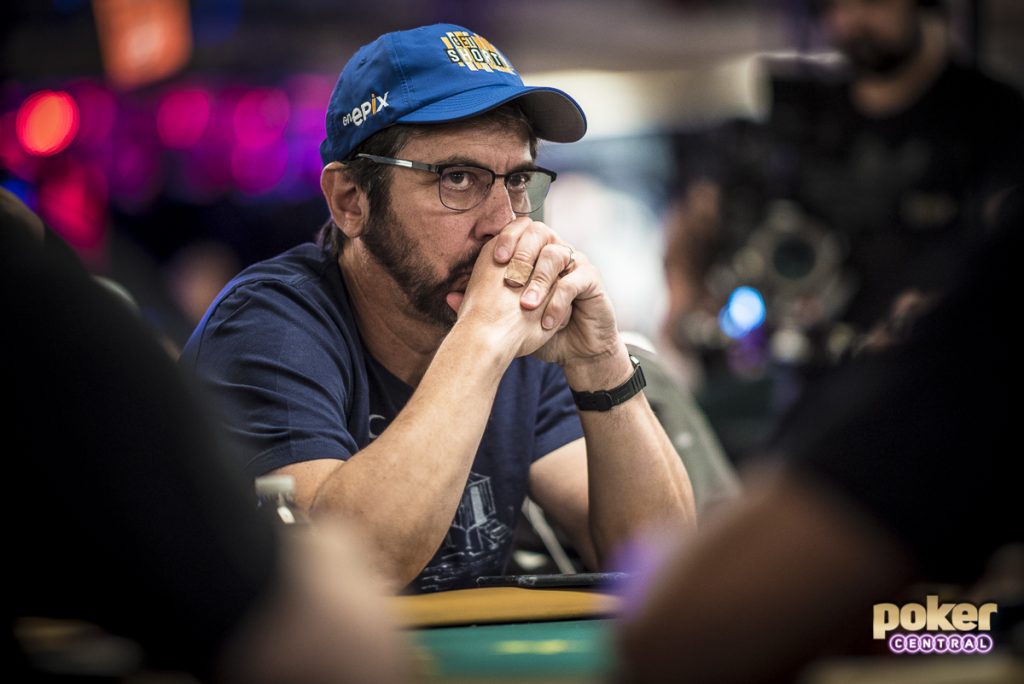
2008 WSOP Main Event NLHE tournament Day 2A, E6 ~25:00
On a river board of A♥ T♥ 3♣ 2♦ Q♣, Jason Young is first to act. His opponent is Ray Romano, the actor.
Young makes a very small bet of 1,200 into a pot of 7,700. As he bets, he says to Romano, “Same bet; I like sitting next to you.”
The “same bet” statement references him betting the same amount on the flop, turn, and river. The second part of his statement implies that he’s making such a small bet because he likes sitting next to Romano and doesn’t want to eliminate him from the tournament—and not because he has a vulnerable hand.
Results: Ray Romano calls with T♦ 4♥. Jason Young has A♣ 9♦, for top pair, medium-strength kicker.
All of the previous misdirection’s have been associated with decent-sized bets; they’ve been attempts by a bettor to distract from the idea of a strong hand. This hand is different because it features a justification for a small, defensive bet. Young’s verbal behavior serves a defensive, pot-controlling purpose, as does his bet; he doesn’t want to check and face a large bet from Romano.
Hopefully reading these examples gives you a good idea of how misdirection’s often show up. The more you try to listen for and understand such small subtle statements, the more sensitive and attuned you’ll become and the less likely you’ll be to fall into a player’s trap.

